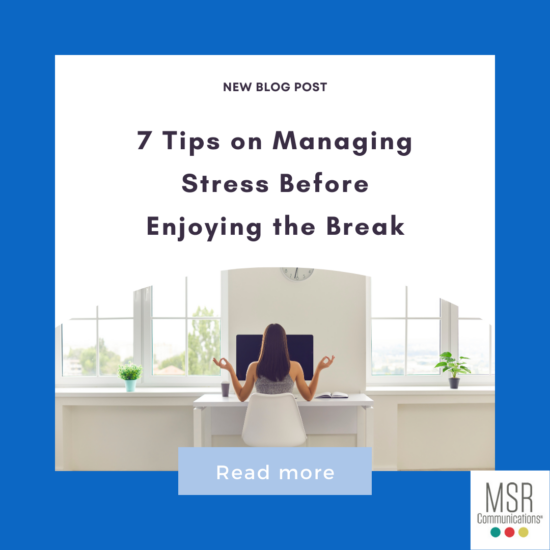By: Trevor Turner
The holidays can bring an air of excitement coupled with an unease in the belly and panic that you may be forgetting something to check off your list before taking the long-awaited holiday break. It’s exciting, a vacation for time spent with family and indulging in delicious food while slowing down and remembering that there is life outside of work. But during this time of year, the feeling of fear may settle in. Fear of forgetting to complete an important task or do a good job before going into the new year.
Despite the holiday season approaching, it can be easy to start feeling stressed, anxious, and tired before the break, so what can you do to manage your mental health so that you don’t break into a stress-induced panic before the holidays?
First, I should let you know I’m not a licensed mental health counselor or therapist, even though I’ve felt like one during moments in my life. I once met with a mental health counselor, and somehow, during the session, the roles reversed, and I was giving her mental health guidance rather than the other way around. Managing my mental health has always been an interest of mine, and experiencing a traumatic health event as a teenager encouraged me to own my mental health by taking an active approach and reading books and articles and listening to experts speak on the topic. I was even lucky enough to be invited to speak to a class of NYU students about mental health.
So the holiday break is right around the corner, and you are feeling the stress, anxiety, and worry kick in. What should you do?
As simple as it is, relax and breathe.
I feel like 95% of the bad outcomes we imagine in our thoughts rarely end up happening, and our “advanced” human brain goes into fight or flight when there is no reason to panic. I believe breathing exercises are often overlooked and serve as a great way to calm down when you feel the panic setting in. Here is a simple but effective breathing exercise you can do instead of hiding under your work desk and breathing into a paper bag.
I once had a manager tell me a fact about worrying that has stuck with me for years. He said everybody is in their own movie, meaning everyone is thinking about their own insecurities and concerns, so the concern spinning around in your head is probably only a worry of yours.
Take breaks.
Allow yourself to take the occasional break during the day to go outside, breathe, and remember there is a life outside of work. It may sound sappy but do a gratitude check and think about 3-5 things you are thankful for in life. I promise it will make you feel better.
Pomodoro Technique.
This time management method is based on 25-minute stretches of focused work broken by five-minute breaks. It’s a practice I consistently follow to prevent stress. Developing the habit of taking breaks is beneficial, and I frequently use a 25-minute timer on my phone as a friendly reminder. This approach helps prevent overworking and promotes a more balanced work routine.
Write stuff down.
Create checklists before going off to break just to be sure you are not forgetting anything. Taking this step should bring you a sense of calm. However, if you still feel stress and anxiety creeping in, set a 5-minute timer and engage in a brain dump. Write down everything swirling around in your mind. Just get it out of your head and on a blank page. As odd as this sounds, it may bring ease to your mind.
Exercise.
Being active and engaging in regular fitness activities is an excellent way to boost your self-esteem and alleviate stress. Establishing a consistent weekly exercise routine is an effective strategy for managing stress in life.
Don’t forget to eat and drink water.
At times, we get so busy we forget to eat and drink while working. Don’t be that person; you are likely not curing cancer or doing brain surgery, so take the time to nourish your body so you don’t become hangry.
Check-In with your team.
Take a moment to check in with your team members not only to make sure you have everything covered but also to say thank you and reflect on the year you had together. Also, ask how they are doing to make sure they are not on the edge of an existential crisis. Sometimes helping others is a good way to help yourself, as hokey as it sounds.
In Conclusion
Remember, the holiday break and a little time off are meant for you to enjoy yourself without any guilt. Reflect on the fact that you’ve successfully navigated another year, hopefully in good health and with workplace success. Take pleasure in your well-deserved break. However, if you find yourself feeling stressed, I hope the recommendations above prove helpful.
Maintaining a strong sense of perspective is important, understanding what truly matters in life, and identifying what is worth the stress and anxiety. I believe maintaining a sense of calm is key to preparing for life’s more challenging moments. It’s essential for our mental health to continually explore and experiment with new and different ways of managing it.
Wishing you all a cheerful holiday and a Happy New Year. Always remain curious and eager to learn, but remember not to overdo it.




